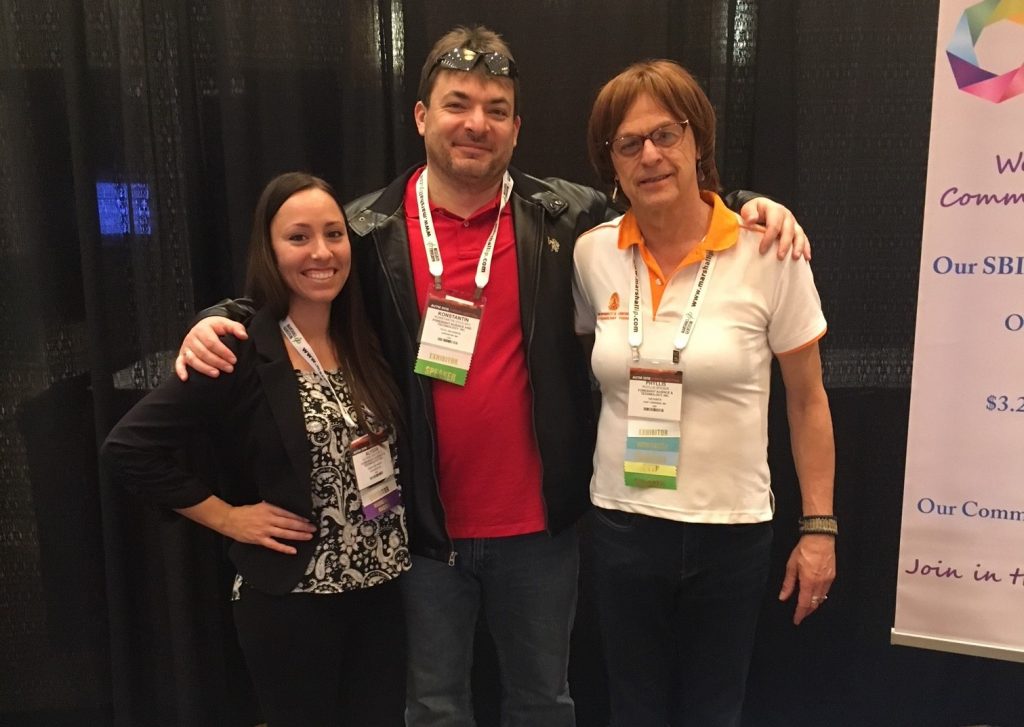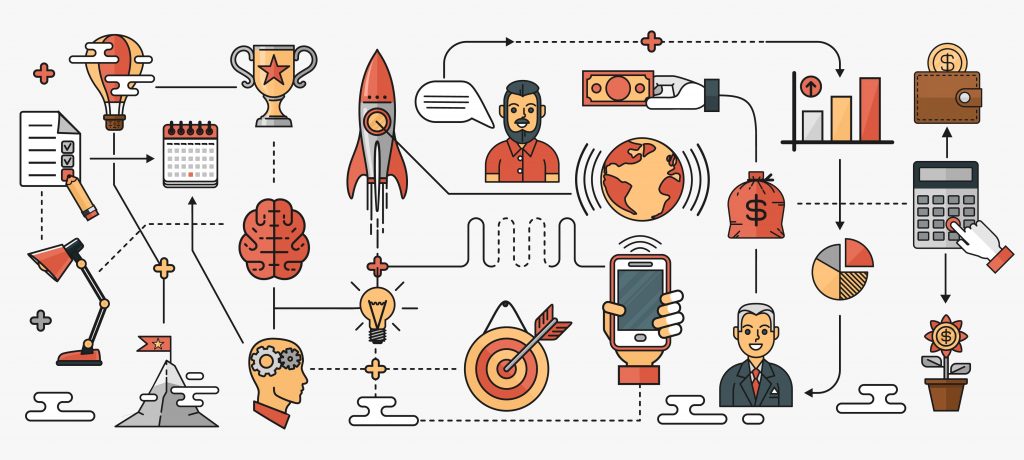Author: Editor
Technology Marketing Training
Posted May 30, 2018
As a Senior Advisor to the President of King Mongkut’s University of Technology Thonburi, Dr. Phyllis Speser has been teaching spin-outs how to work trade fairs to gain initial customers along with Eliza Stefanow, a senior member of KMUTT’s technology transfer office, and Dr. Chanikarn Wongviriyawong, CEO and founder of EatLab, a spinout based on applying advanced AI algorithms for image processing and big data algorithms to create a more effective and less expensive way of determining likely product success and rates and extent of market penetration in the food processing and restaurant sectors. The training took place at Thaifex, a huge trade show for food and beverage manufacturers throughout Asia. The training emphasized seeking beta testers who would be willing to coauthor articles in trade publications and place orders if the technology worked as promised. As part of the training Eatlab landed several potential lead customers.
International Collaboration Panel
Posted on February 22, 2018
On February 18-21 Foresight Science & Technology participated in the AUTM Annual Meeting in Phoenix, Arizona. Dr. Phyllis Speser, Foresight’s Chair of the Board and Dr. Konstantin Izvolsky, Director of Consulting and Training were also part of the AUTM panel “International Collaboration Models for Technology Transfer” as the Moderator and Presenter respectfully. Other panel presenters included: David Ai, City University of Hong Kong, Nares Damrongchai, Thailand Center of Excellence for Life Sciences, Shawn Hawkins, St. Jude Children’s Research Hospital and Eliza Stefaniw, King Mongkut’s University of Technology Thonburi.
The globalization of modern economy results in the expansion of international collaboration between universities, research institutions and businesses around the world. Foresight’s own discussions with international clients emphasize the importance and growing interest in international collaboration. To address the interest of our clients in this aspect of the technology commercialization Foresight makes the introduction to the international collaboration a part of the training course on the basics of technology commercialization. Currently this training course is presented by Dr. Speser to the TTO staff and industrial liaison managers in King Mongkut’s University of Technology Thonburi (KMUTT) in Thailand.
The panel discussed the importance of considering the cultural differences and specifics in dealing with global partners. The key point, emphasized by all panelists is the importance of blending the unique cultural advantages offered by each individual country with the heavily westernized global business culture to build and maintain the efficient and productive the long-term partnerships.
One of the panelists, Dr. David Ai from City University of Hong Kong discussed the challenges in establishing working relations with Chinese businesses. It is not a secret that developing strong relations with Chinese partners is challenging due to cultural, political and economic barriers. The significant role of the government in multiple aspects of Chinese business as well as the attempts of Chinese and local governments to make the business dealing more transparent have the significant impact on technology transfer, partnership and business development. Dr. Ai emphasized the importance of strategic planning in dealing with Chinese partners as well as accurate selection of “technology champion” (usually on the local government level) capable of promoting and supporting the collaboration.
Dr. Konstantin Izvolsky from Foresight Science & Technology discussed the criteria which should be used to identify a potential commercialization partner in Life Science industry. In Foresight’s experience, the size of the partner not always indicates its willingness to cooperate and support the outside technology. Based on the analysis of interviews conducted with the experts in life science industry, Foresight was able to identify common trends supporting the notion that smaller companies may be more willing to adopt the early stage outside technologies, but it will require much more focused approach from small startups. This information can be useful for small international life science startups trying to bring their innovations to the US market.



AUTM 2018 Exhibit
Foresight Science & Technology again exhibited at the AUTM Annual Meeting, this year in Phoenix, Arizona February 18th through the 21st.
As always, this event gave us the opportunity to meet with current and future clients.
Presentation to United Nations
Foresight Board Chair, Dr. Phyllis Speser, made a presentation to the United Nations Development Programs International Conference on Entrepreneurship in Bangkok Thailand on February 8, 2018. In her talk she focused on how the often discussed tensions between traditional entrepreneurship and social entrepreneurship is a false dichotomy. She used the current water crisis in Cape Town, South Africa as an example, noting that if you had a low cost, high volume, efficient water desalination technology which could be implemented in a few months you could make a fortune there. She offered other examples from Thailand and the US which are less dramatic but still money makers. She then explored how to get these new technologies into the market by using an ecosystem approached based on supply chain entry and management. Phyllis concluded by noting successfully entrepreneurs build companies that address real and acknowledged problems. In today’s world of global climate change and population pressure on resources there are amply opportunities to find problems which are both money makes and further sustainable development goals.
The next day, Phyllis meet with student entrepreneurs from the ASEAN region to provide coaching and mentoring on how to make their start-ups thrive
Thailand LES 2018
Posted on February 2, 2018
On February 1, 2017, Foresight Board Chair Phyllis Speser, J.D., Ph.D., R.T.T.P., gave the Keynote Address at the Thai Licensing Executives Society (LES) Annual Meeting. The meeting was focused on the Impact of Industry 4.0 and artificial Intelligence on the practice of intellectual property law in Thailand. The quick take-away from the meeting for Foresight clients was there is a lot of government money in Thailand for R&D, product development, and manufacturing in-county and for establishing subsidiaries or companies there. Equally important, Thailand is a country which strongly respects IP rights.
Dr. Speser has become a leading authority on IP and commercialization throughout Thailand. She is currently consulting as the Senior Advisor to King Mongkut’s University of Technology, Thonburi – a leading Thai university in Bangkok and number 31 globally in industry funding.
In her speech, Dr. Speser explicitly said she would not discuss the ethical issues connected with AI. She would instead explore three impacts of deep convergence and other advanced AI methods on IP itself. She began by exploring how machines got better at pattern recognition and authoring, the way IP law firms file, prosecute, and seek to invalidate patents will change. This change will increase the importance of software technicians in law offices at the expense of IP lawyers and paralegals unless we change our skill mix and the education of legal professionals. Second, she discussed the impact on the value of IP for companies in a world where design around of patents and independent invention of trade secret by smart machines is increasingly easier on the one hand and the rate of invention increases rapidly due the productivity of researchers using smart computers on the other hand. Since the value of IP is partially tied to its ability to grant a de jure or de facto monopoly position over an extended period of time, we should expect IP (other than fundamental patents) to have less value. Third, she explored the impact on IP law itself when machines independently invent. Referencing Naruto v. Slater, the famous copyright dispute that ended by denying protection to a selfie snapped by a monkey on the grounds all the photographer did was set up the equipment and thus the selfie was not an “original intellectual conceptions of the author,” she argued machine-made inventions may be denied patent protection on analogous grounds (setting up a self-learning and training software program and pushing the start button is not invention). Further, it is well established a parent does not own the inventions of their child nor does a patent for manufacturing equipment gives the licensor rights in the product made with the licensed equipment. Underlying both is the assumption people should own the fruits of their labor. Analogous to the former, an inventor might be denied ownership of the independent unpredictable inventions of intelligent software which learns by creating its own neural net training sets or other independent means. It is not their labor which is bearing fruit. It is the labor of the smart machine they gave “birth” to. Analogous to the latter, selling an AI program to a company may not allow asserting rights to what it creates. A license to use does not give ownership to the product of that use. All three cases (the monkey, the parent, the product) raise interesting questions about the implicit role of human created “techne” (intentional technique which creates known outcomes) as the grounding assumption underlying all IP law. We see this assumption in the first patent ever. In ancient Greece, a patent was issued to encourage disclosure of a food recipe (literally the “secret sauce”). The first English patent was to obtain disclosure from a Dutch company to Englishmen of a method of making glass. The issue for IP law is what happens when techne is separated from human intervention and invention – when the machine invents the techne on its own without any meaningful human intervention. It is not yet clear how patent agencies and courts around the world will handle that issue. One path is to use the analogy to the monkey selfie and deny patent rights. The other path is to update the assumption behind patent law to allow granting rights for non-human created IP. The latter, however, may open a new bad of worms concerning who owns the patents of children, students, and apprentices. Not surprisingly, this talk was very well received and repeatedly referenced in discussions over the meeting’s two days.

Above Phyllis Speser is pictured with Alan Adcock- Deputy Director, Intellectual Property at Tilleke & Gibbins and President of LES Thailand, and Wilaiporn Chetanchan- Director, Corporate Technology at the Siam Cement Group, the largest and oldest cement and building material company in Thailand and Southeast Asia. She is one of the founders of LES Thailand.
Foresight Receives Phase II SBIR to Research Novel Method of Fire Ant Control
Foresight has received a Phase II SBIR grant from the U.S. Department of Agriculture’s (USDA) National Institute of Food and Agriculture (NIFA) to further develop a novel biologically-based method to manage invasive and native pest ant populations, primarily red fire ants. In Phase I, Foresight demonstrated that the compounds negatively affect potential colony queens and cause worker ant mortality. In the Phase II, Foresight will field test prototype bait products with assistance from USDA, Agricultural Research Service through a CRADA. A natural insecticide/bait for Red Imported Fire Ant (RIFA) control would provide an effective environmentally neutral option that would reduce the need for potentially damaging chemical treatments. The new RIFA bait option will benefit many economic sectors afflicted by RIFAs, such as agriculture, electric & communications, schools, residential households and will support economic development of rural organic farming.
Learn more about the grant here
For further information about Foresight and this project, please contact Norton Kaplan by telephone at: 1-401-354-1342 or by email at: Norton.kaplan@foresightst.com.
EPA SBIR Phase I 2017 Kick-Off
For well over 15 years, Foresight has been the Commercialization Support Contractor for the EPA Phase 1&2 SBIR Program. Over the years the program has transformed from generating market data reports to strategic consulting on an individual basis. Feedback from the Awardees along with the commercialization results realized by the participants validate the evolution from “one size fits all” to a flexible and personalized approach is working. The EPA SBIR Kick-off meeting held on October 11, 2017 provided the opportunity for the Foresight Science & Technology Senior Managers to meet directly with the Awardees. What was notable in these meetings was the quality of the preparedness of the participants along with the market knowledge that accompanied the Awardee presentations packages. The emphasis on commercialization and strategies was the focus of the conversations and less on the technology development issues.



